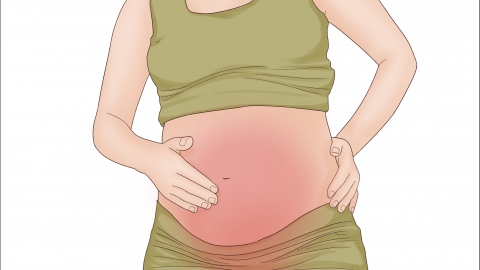What causes hair growth on the abdomen during pregnancy?
Generally, the growth of abdominal hair during pregnancy may be caused by genetic factors, hormonal changes, hirsutism, polycystic ovary syndrome (PCOS), Cushing's syndrome, or other reasons. Symptomatic management through general treatment or medication may be required. If physical discomfort occurs, it is important to seek medical attention at a hospital as soon as possible. The specific analysis is as follows:

1. Genetic Factors
If women in the family have experienced similar abdominal hair growth during pregnancy, the pregnant woman herself may have an increased likelihood of experiencing this condition. It typically does not accompany other symptoms and does not require special treatment. A balanced diet and regular sleep patterns are recommended to support overall health.
2. Hormonal Changes
During pregnancy, hormonal levels in the female body change significantly. The secretion of estrogen and progesterone increases greatly, while the adrenal reticular zone may secrete excessive amounts of testosterone. These hormonal fluctuations can stimulate hair follicle growth and activity, leading to hair growth on areas such as the abdomen. Usually, no special treatment is required, as abdominal hair typically decreases or even disappears gradually after delivery as hormone levels return to normal.
3. Hirsutism
Hirsutism is a condition characterized by abnormal excess body hair growth, often related to hormonal imbalances. Patients may experience abnormal levels of androgens, which can cause overactive hair follicles, resulting in increased hair growth on the abdomen and other areas. In addition to abdominal hair growth, increased hair growth may also occur on the face, back, and other regions. It is recommended to use medications such as spironolactone tablets, flutamide tablets, or cyproterone acetate tablets under the guidance of a physician.
4. Polycystic Ovary Syndrome (PCOS)
Polycystic ovary syndrome may result from interactions between genetic factors, lifestyle, and other influences, leading to elevated levels of androgens in the body. Increased androgen levels stimulate hair follicle activity, causing abdominal hair to grow faster and become coarser during pregnancy. It is recommended to use medications such as progesterone capsules, dydrogesterone tablets, or letrozole tablets under the guidance of a physician.
5. Cushing's Syndrome
Cushing's syndrome is a disease caused by abnormally elevated cortisol levels. High concentrations of cortisol disrupt normal hormonal balance, accelerating hair growth—particularly in the abdominal area. Patients may also experience symptoms such as weight gain, hypertension, and thinning skin. It is recommended to use medications such as mifepristone tablets, bromocriptine mesylate tablets, or ketoconazole capsules under the guidance of a physician.
Pregnant women are advised to attend regular prenatal checkups at the hospital to monitor their health status and the development of the fetus in a timely manner.




